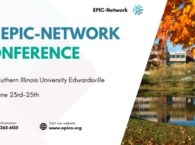TriMet, OR – 2020 Outstanding Community Partner Award Winner

Jeb Doran and all of TriMet, the Portland, Oregon regional transit agency are the 2020 Outstanding Community Partner Award winners!
Every year, EPIC-N celebrates outstanding contributions by university programs and community partners through the 2020 EPIC-N awards.
As more public agencies recognize the implications of climate change, TriMet has spent decades leveraging large transit and multi-modal projects to reduce impacts on the environment. To continue to advance their innovations in policy, design, and technology, TriMet sought ways to expand the resources that explore innovation in sustainable practices and create frameworks that support earlier implementation of those practices. TriMet partnered with the University of Oregon’s Sustainable City Year Program (SCYP) to help achieve the agency’s priority goals related to sustainability and climate change. In addition, partnering with TriMet and their Southwest Corridor (SWC) project initiated a whole new chapter for SCYP.
TriMet marked the first opportunity for SCYP to partner with a transit agency
Prior to TriMet, SCYP had partnered with cities to address projects that were not necessarily related to each other. With the TriMet partnership, SCYP projects centered on the SWC, a single light rail transit infrastructure project. This required coordination and involvement of multiple city, regional, and state partners at all levels of their agencies, from staff to general manager, and facilitated engagement throughout the year.
While the primary goal of any new transit project is to engineer a safe, functional system, TriMet embraces the approach of those additional possible benefits that can be realized, including: improved mobility and accessibility, expanding regional economic vitality, better connecting people to stations and ultimate destinations, and enhancing multimodal access including pedestrians, bicycles, autos, and freight.
No other SCYP partner had focused its projects and outcomes as explicitly on the nexus between sustainability-focused projects and the livability of regions, cities, neighborhoods, and individual sites. TriMet’s project selection and categorization of projects–placemaking, climate change, community building, and urban mobility–created the space for students and SWC partners to address these critical and time-sensitive issues. While a myriad of classes addressed and embedded sustainability in their coursework, the following classes had sustainability as the foundational element:
- Sustainable Transportation (focused on the City of Tualatin);
- Sustainable Urban Design Studio and Seminar (focused on the City of Tigard)
- 68th Avenue Station and Red Rock Creek Transit-Oriented Development Design Studio (focused on the City of Tigard)
- Civic Ecology and Urban Design (focused on the City of Tigard)
- Walkability and Placemaking in the City of Tigard
- Integrating Green Infrastructure and Urban Ecology in Transit Stations (system-wide)
- Active Transportation Designs for Portland Neighborhoods (focused on sites within the City of Portland)
TriMet’s far-reaching and thoughtful approach created an environment where students could contribute to a livable future, and demonstrates how TriMet went above and beyond in their project scoping, partner engagement, and interactions with students. TriMet also allowed students to adapt their personal ideas to concepts that resonate with real-world challenges and opportunities, allowing students to explore innovation and “out of the box” ideas.
Follow-up after the formal partnership ended
After the partnership ended, TriMet did a national search to hire a summertime to synthesize the individual SCYP project reports into one cohesive opportunities document. This final report outlined key recommendations for consideration as the SWC project design evolves and progresses and also identifies key attributes that embrace applied sustainability and outlines opportunities for other complementary projects and adjacent development to build upon those efforts. This creates a unified community principle of sustainability both within and around the SWC project. The report has been shared with SWC partners and other interested parties.


